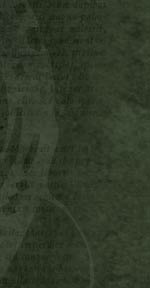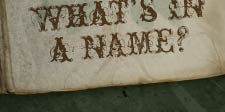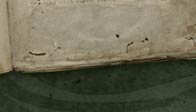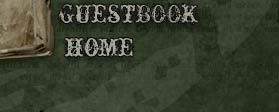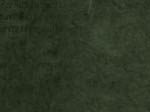- Confirmed by JK Rowling
- Very confident in its accuracy
- Moderately confident in its accuracy
- Not very confident
- Confirmed false, but I felt like posting it anyway.
Bagman, Ludovic (Ludo) - head of the Ministry's Department of Magical Games and Sports. A bit short on cash.
- "Ludo" is Latin for "to play, sport", but can also mean "to delude" or "to deceive". This reflects both his sporting ways and his brief deception of both the goblins and the Weasley twins. However, "Ludovic" could be an abreviated form of "victor ludorum", which means "winner of the games", and reflects his days back playing with the Wimbourne Wasps.
- A "bagman" collects money for illegal gambling businesses and loan sharks. This goes way back to the early gangster/mob crime days in the United States. The bagman either collected the weekly bribe money from businessmen who were being "protected" (meaning exploited) by the big local crime boss; or he collected the profits from local illegal gambling establishments and delivered them to boss headquarters; or in some instances he was the person who held on to stolen goods until they could be disposed of, hence the phrase "he was left holding the bag" means someone who was caught doing something wrong while his cohorts excaped scot-free.
Bagnold, Millicent - Minister of Magic before Cornelius Fudge
- "Millicent" is a possible reference to Anthony Burgess' A Clockwork Orange, in which "millicent" is Nadsat (slang) for an officer of the law.
- "Bagnold" is a spoonerism of "old bag", a rather rude slang term for a disagreeable old woman.
Bagshot, Bathilda - author of "A History of Magic"
- Bathilda derives from "bathilde", meaning "embattled." Bagshot is a form of ammunition, composed of a canvas bag filled with lead balls (shot), fired from a cannon. Together, this name paints a pretty violent picture of magical history.
Bane - one of the three centaurs Harry encounters in "Philosopher's Stone"
- "Bane" comes from the Anglo-Saxon "bana", which means "murderer". Hence ratsbane, henbane, etc, which are deadly poisons. It can also mean "to poison" or "to harm".
- Simon suggests a second meaning: A bane can be a prelude of a play, which references his interest in divination.
Banshee - Seamus' boggart; Bandon Banshee banished by a harelipped witch (Lockhart took credit)
- Also spelled "Bean Sidhe," the banshee is a spirit from Irish folklore whose scream announced immanent death. She has long streaming hair, and her eyes are fiery red from the constant weeping.
- Bandon is a town in Ireland.
Barkwith, Musidora - famous composer whose "Wizarding Suite" featured an exploding tuba. This unfinished work is now banned, ever since a performance in 1902 blew the roof off of the Town Hall of Ackerly (Wizard Card #36).
- Musidora: Similar to "music." Also the name of a well-known early French film actress, but I don't know of any of her roles that might establish an etymological connection.
- Steve Vander Ark of the HP Lexicon makes this clever suggestion: "Bark" might be connected to the somewhat cartoonish idea that dogs bark when they hear music being played or sung extremely poorly.
Barnabas the Barmy - depicted in a tapestry being clubbed by trolls
- Saint Barnabas was a travelling companion of the Apostle Paul. On a missionary journey to Iconium and Lystra in Lycaonia, they were first acclaimed gods and then stoned out of the city.
- "Barmy" is British slang for "crazy, idiotic."
Basilisk - Slytherin's monster inhabiting the Chamber of Secrets.
- The mythical king of the serpents. In art, the basilisk symbolized the devil and the antichrist. According to legend, there are two species of the creature. The first kind burns everything it approaches, and the second kind can kill every living thing with a mere glance. Both species are so dreadful that their breath wilts vegetation and shatters stones. The only way to kill a basilisk is by holding a mirror in front of its eyes, while avoiding to look directly at it. However, even the basilisk has natural enemies. The weasel is immune to its glance. A more dangerous enemy is the cock for should the basilisk hear it crow, it would die instantly. (from Encyclopedia Mythica)
Upon learning that the weasel was the Basilisk's natural enemy, many were surprised that Ron didn't have a larger part in its destruction. However, with the release of Order of the Phoenix, some have questioned whether this wasn't played out to a lesser degree with Ron's father, Arthur, when he recovered from the deadly snakebite. It's not a perfect parallel, but it's something to think about.
Beauxbatons - French wizarding school, led by half-giant headmistress Olympe Maxime.
- "Beaux": handsome [French] + "batons": sticks/wands [French]. Incidentally, in the French translations for Harry Potter, Menard uses "baguettes" for "wands," giving Jo the option of using "Beauxbaguettes" instead of "Beauxbatons", but as that sounds like a French pastry, Jo clearly made the right choice.
And an amusing addition from Rita Winston on HP4GU: "I believe that the locations of the greatest wizarding schools is less related to the current location of Muggle national borders than to the location of said Muggle borders 1000 years ago when the schools were founded. Okay, I really am thinking less than 1000 years when I suggest Beauxbatons as the school of the Bourbon Empire, and Mme. Maxime telling Dumbledore that her giant flying horses only drink single-malt whisky is a pun on Bourbon whisky."
Belcher, Humphrey - misguided inventor of the cheese cauldron
- A belch is a particularly loud burp. As for his creation, one has to wonder whether he actually created a cauldron made of cheese, or invented Cheese Fondue.
Bellatrix (Black) Lestrange - See Lestrange, Bellatrix.
Bezoar - a stone taken from the stomach of a goat which will save one from most poisons. Used in many antidotes.
- A bezoar is a sort of calculus or concretion, a stone found in the intestines of mostly ruminant animals. There are several varieties of bezoar, some of which have inorganic constituents and others organic. Bezoars were formerly sought after because they were believed to have the power of a universal antidote against any poison. It was believed that a drinking glass which contained a bezoar set within would neutralize any poison poured into the glass. (TheFreeDictionary.com)
Bicorn - the powedered horn of a bicorn was an ingredient in the Polyjuice Potion
- The bicorn is a mythical beast, fabled by the early French romancers to grow very fat through living on good and enduring husbands. It was the anti-type of the Chichevache, which is monster who lives only on good women, and was hence all skin and bone, because its food was so extremely scarce. On behalf of women everywhere, I'm insulted.
Binns, (Professor) - Hogwarts "History of Magic" teacher. A ghost.
- Named "Binns" most likely because he's "rubbish" at teaching.
- Another theory comes from Morag Traynor, via the HP Lexicon. "Binns' name is a subtle bit of wordplay; I imagine him wearing very thick lenses -- "bins" (from binoculars) is a slang term for spectacles."
(Black), Andromeda Tonks - See Tonks, Andromeda Black.
Black, Alphard - Sirius' uncle, who gave him a bit of money when he ran away
- "Alphard" is a star in the constellation Hydra. It's name is derived from Al Fard al Shuja, meaning "The Solitary One in the Serpent," pertaining nicely to his decision to be one of the few in his family of Slytherins to help Sirius.
(Black), Bellatrix Lestrange - see Lestrange, Bellatrix.
Black, Regulus - Sirius' brother, a Death Eater
- A first-magnitude star in the constellation Leo. His name means "prince" or "heart of the lion." Also called Alpha Leonis.
- For more information on Regulus' name, see The Harry Potter Lexicon. WARNING: CONTAINS MAJOR SPOILERS FOR BOOK SEVEN! READ AT YOUR OWN RISK!
(Black), Narcissa Malfoy - See Malfoy, Narcissa Black.
Black, Sirius - Best friend of James and godfather to Harry, dog animagus.
- Sirius is the "dog star", the brightest star in the sky and in the constellation Canis Major (one of Orion's hunting dogs). Interestingly enough, Sirius is actually a binary star, and the smaller star (called Sirius B and nicknamed "the pup") is a black dwarf.
Blibbering Humdinger - a creature invented by The Quibbler
- "Blibbering" seems to be a cross between several words (blabbering, gibbering, etc) that mean "to talk foolishly or excessively." A "humdinger" is a striking or extraordinary person or thing.
Blood-Sucking Bugbear - creature Hagrid assumes is killing his chickens
- A bearlike monster from popular myth said to devour naughty children.
Bludger - Quidditch ball that tries to knock people off their brooms.
- "Bludger" is a word from Australian slang, referring to someone who hangs around and appears to be working but is not pulling his/her weight. Also, "bludgeon" means "to hit, usually with a large, blunt object, like a club".
Bode, Broderick - member of the Ministry's Department of Mysteries. Killed by Death Eaters.
- A "bode" is a warning or omen.
Boggart - Shapeshifter that takes the form of your greatest fear.
- Curiously, JKR's boggarts have little in common with the boggart from traditional folklore. Outside the Potter universe, boggarts are household spirits from the north of England. The dark and hairy boggarts are dressed in tattered clothes, with meddling hands and clumsy feet. The presence of a boggart is betrayed by the unusual number of small accidents and strange noises after dark. They tip over milk bottles, frighten cats, pinch little children, blow out candles, and cause many other mishaps. (From Encyclopedia Mythica)
Bogies, Curse of the - See "Curse of the Bogies"
Bole - Slytherin beater (PoA, OoP)
- According to Steve Vander Ark, "Bole = the trunk of a tree, an apt name given the build of a typical Slytherin Beater."
Bonaccord, Pierre - the first Supreme Mugwump of the International Confederation of Wizards
- "Bon accord" is dog French for "a good agreement."
Boomslang Skin - one of the ingredients in the Polyjuice Potion
- The boomslang (Dispholidus typus) is a species of South African snake. Boomslangs live in trees and bushes and feed on small animals and bird eggs. They are greenish to brown or black in color and grow to about 1.5 m (about 5 ft) long. Most members of the family (Colubridae) to which the boomslang belongs are harmless, but the boomslang has a potent venom that it delivers through large, deeply grooved fangs that are located at the rear of the mouth. The bite of the boomslang can be fatal. (From Encarta Encyclopedia)
Borage, Libatius - author of Advanced Potion-Making
- Libatius: from "libation", "the pouring of a liquid offering as a religious ritual", or "an intoxicating beverage."
- Borage: An annual, bristly European herb having blue or purplish star-shaped flowers.
Borgin - co-owner of Borgin and Burke's
- While "Burke" is definite, "Borgin" is less clear. "Borghild" was a character from the Volsunga Saga (an Icelandic saga from the 13th Century), the first wife of Sigmund, who poisons Sinfiotli in revenge for killing her brother. Other possible etymologies for Borgin include a derivation from "burglar" (with obvious links to Burke), "burgeon" (no significance whatsoever), or "Bourgogne" (the French name for Burgundy -- again, no significance).
Borgin and Burke's - a shady business in Knockturn Alley See entries for Borgin and Burke, Caractucus.
Bowtruckle - a tree-guardian
- "Bow" can also be spelled "bough", which is a word for a branch of a tree. "Truckle" means "to be submissive", but that doesn't sound as likely.
Bragge, Barberus - changed the face of Quidditch when he offered 150 galleons to whomever caught a Golden Snidget he had released onto the pitch
- Barberus == Barbarous, which means "Characterized by savagery; very cruel."
- Bragge == Brag, which means "to boast, to speak with excessive pride"
Bring and Fly Sale - mentioned by Rita Skeeter in OotP.
- The wizarding answer to the "Bring and Buy Sale."
Broadmoor, Karl and Kevin - beaters for the Falmouth Falcons, known for their violent playing style
- From Ross Gillson, via the HP Lexicon: "The brothers' brutal style of Quidditch play is particularly apt, as Broadmoor is an English high-security prison for mentally insecure criminals"
Brown, Lavender - Gryffindor interested in Divination.
- A rather humorous name. As "Brown" is such a dull surname, Lavender's parents must have felt the need to give their daughter a more interesting, elegant color name to compensate.
Bubotuber - plant whose pus is used for medicinal purposes, mainly to cure acne, but is dangerous when undiluted.
- "Bubo" is an inflamed swelling of a lymph node. A "tuber" is a swolen, underground stem.
Buckbeak - a hippogriff
- "Buck" refers to his horse-half. A buck is a male animal, especially a male deer or antelope. "Beak" references his bird-half. Compare with "Witherwings", his second name.
Burke, Caractucus - Co-owner of Borgin and Burke's
- Caratacus (also Caractacus, Caradoc) was "a barbarian chieftain who was captured and brought to Rome and later pardoned by Claudius, wandered about the city after his liberation; and after beholding its splendor and its magnitude he exclaimed: 'And can you, then, who have got such possessions and so many of them, covet our poor tents?'" (from Cassius Dio, Roman History)
- "Burke" refers to William Burke, a murderer and grave-robber. Though he and his partner, William Hare, most commonly provided cadavers for Edinburgh anatomy schools, I wouldn't be surprised to see the shop selling some of William Burke's wares.
Burke's - see "Borgin and Burke's"
Burning Day - the day Fawkes is reborn
- Compare with "Bonfire Night," another name for "Guy Fawkes Day."
Burrow - home of the Weasleys
- As a "burrow" is a hole in the ground made by an animal for shelter and habitation, it's an appropriate name for a family whose last name is "Weasley."
| Previous Letter | Names Index | Next Letter |




